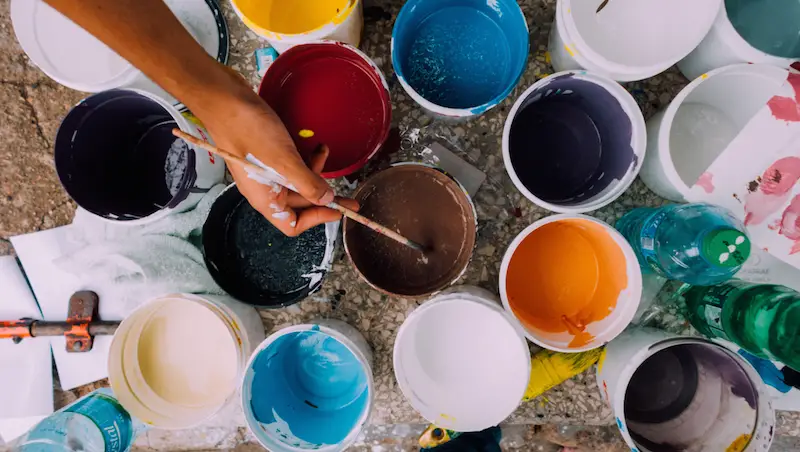I don’t know if this has happened to you too (yet, I bet it has), but many times in the past I used to find myself procrastinating throughout the day, though I really love my job. Deep inside I wanted to create new projects, but I was feeling tied down by daily routine, and I had very little time to think creatively. Every day I used to promise myself, “Today I will focus on my new projects and nothing else, and I will keep doing that until they are complete.” But I couldn’t keep that promise. Something else always needed my immediate care. My priorities were never set on what I wanted to create.
It was at that moment I realized that my creativity has been blocked. Instead of investing my time in things that inspire me, I was merely spending it doing administrative stuff and running errands all day long. This spoiled my energy and made me exhausted, disoriented and in a negative mood that not only left me far from inspired, but also caused me to lose my focus on the creative projects that were important to me.
But why do we, adults, end up living in a mostly uncreative way? Little by little, day by day, we forget the behaviors we used to have as kids that enhanced our creative attitudes. We focus more on the “shoulds” and “musts” of the daily life, which dictate a very strict and uninspired way of behaving: following a very precise program of “to dos”, going to work, meeting specific social obligations and running errands for our household or job. This condition leads us far away from some wonderful habits we used to have before we reached adulthood. These childhood behaviors, if carried into adulthood and adjusted to our adult lifestyle, can ensure increased creativity and allow us to develop our creative side so that we actually implement all our creative projects enjoyably and to our benefit.
So, what are the things we can learn from kids in order to keep our creative muscle energized and in shape? Here are three habits to incorporate into your daily life:
#1 Never take something for granted.
Children examine everything as totally new information, from the simplest object to the most elaborate scene. They exhibit a constant natural curiosity about everything, from a regular object, like their plastic goblet, to more elaborated ones like a mechanical toy, a TV set, or a bicycle. This big “why” children keep asking all the time is a rich source of knowledge and inspiration. As adults, we take a lot of this for granted and we don’t put many questions into our daily routine. If we start following kids’ examples, this could provide us with new perspectives of the “usual” and the “routine” and thus with refreshing solutions to overcome our constant preoccupation with uncreative obligations.
#2 All is done happily.
The quest for creativity is a source of happy emotions for children. When they create, they do it joyfully, and they are happy because they can express their creativity. This is the loop of creativity. The more we create, the more happy we become, and when we are happy we can be more and more creative. Non-creative activities do not offer us any positive emotion, only frustration and stress, that after a while drains our creative energy, leaving us unmotivated and easily overwhelmed. In order to re-boost our own creative loop, we can create minor projects that will certainly provide us with positive emotions upon their completion. These emotions will become the basis of new creative projects.
#3 Perfection is not an issue.
Children do not project high expectations on their creativity. They do not expect to ensure the best outcomes in order to realize an idea. They merely conceive and start creating in the physical plane. They don’t put obstacles in the way of manifestation, such as, “If it is not perfect, it’s not worth doing.” In the end, they have their idea done (e.g. a painting, a song, a pottery sculpture), along with great satisfaction over their accomplishment (aka a boost of positive emotions) and a newly acquired experience that offers betterment to their skills. We can do the same thing; start creating without criticizing our projects with an overdose of perfectionism. The results will surprise you with unadulterated joy.
So how much time and energy does it take to start implementing the core ideas of these strategies to our own adult daily life? It suffices to let ourselves stay genuine to our personality and apply them in small ways to our natural behavior.
Do you ever feel creative blocks in your own activities? Have you ever considered the child mindset as a way to break free of those barriers?
———-
Panagiota is a Cognitive Psychologist with a long experience in international scientific research. For many years now she loves practicing her counselling, life-coaching and creativity coaching activities helping people walk their path of personal growth and fulfil their life goals. Furthermore, she is a trained meditator and adores teaching meditation and mindfulness techniques to people, especially children!
Panagiota is the author of many scientific articles and books, including the “Handbook of DreamMaking: A Life-Coaching Fairy Tale for Adults”.
Erin shows overscheduled, overwhelmed women how to do less so that they can achieve more. Traditional productivity books—written by men—barely touch the tangle of cultural pressures that women feel when facing down a to-do list. How to Get Sh*t Done will teach you how to zero in on the three areas of your life where you want to excel, and then it will show you how to off-load, outsource, or just stop giving a damn about the rest.





I believe that we have a lot to learn from kids, don’t you think? As for the first habit, I have to say that my son really taught me to be happy by all things. Once, I gave him a pen so he could draw in my old notebook, and he was just as happy as when I bought him a whole playground from Goodevas. And he gets so thrilled about everything, and it amazes me every time.
에볼루션코리아
025YfGdMg!&@
에볼루션카지노
343Fozxfw$-“
에볼루션바카라
512xELuNE]&{
에볼루션블랙잭
898koLIpA}~|